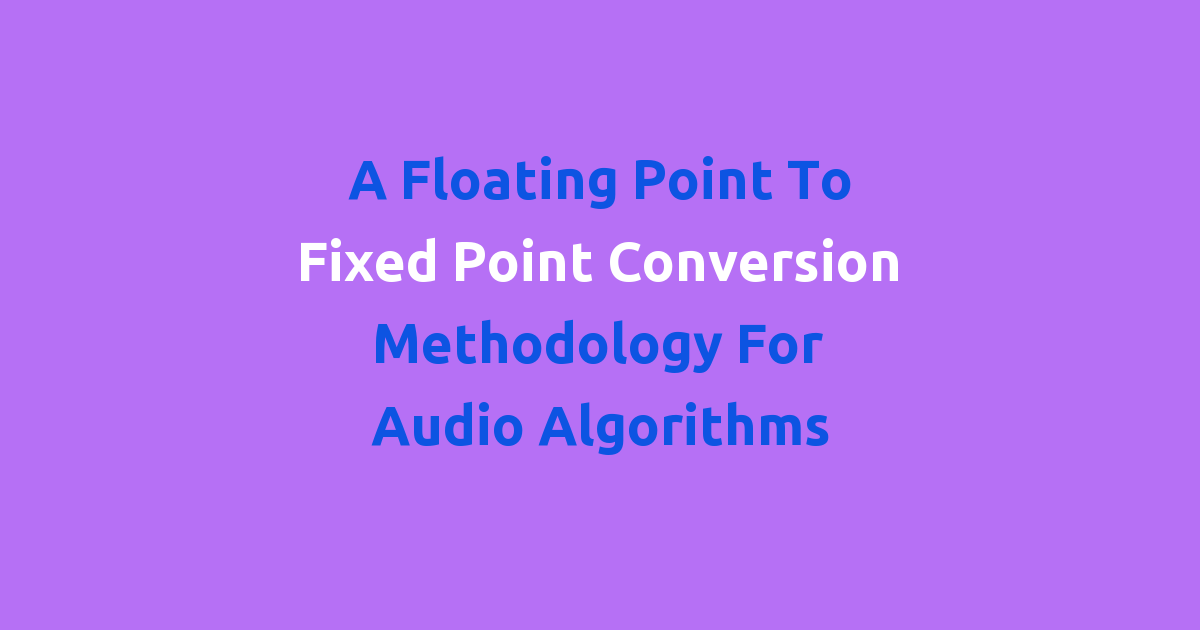A method for converting floating point values to fixed point values in audio algorithms.
Introduction
As technology continues to advance, the need for more efficient and high-performing audio algorithms has become increasingly important. One key aspect of optimizing these algorithms is ensuring that they are able to perform calculations quickly and accurately. This often involves converting floating-point operations to fixed-point operations, as fixed-point arithmetic is typically faster and more efficient than floating-point arithmetic.
Problem Statement
While floating-point arithmetic is more accurate than fixed-point arithmetic, it is also more computationally expensive. This can be a significant bottleneck when it comes to real-time audio processing, where speed is crucial. As such, there is a need for a methodology to efficiently convert floating-point audio algorithms to fixed-point arithmetic without sacrificing accuracy.
Existing System
Currently, many audio algorithms are implemented using floating-point arithmetic due to its higher precision. However, this can lead to significant overhead, especially in resource-constrained systems such as embedded devices or digital signal processors (DSPs). As a result, there is a growing interest in converting these algorithms to fixed-point arithmetic to improve performance.
Disadvantages
One of the main disadvantages of using fixed-point arithmetic is the potential loss of precision. Unlike floating-point numbers, fixed-point numbers have a limited range and granularity, which can lead to quantization errors and reduced accuracy in calculations. Additionally, converting algorithms from floating-point to fixed-point can be a complex and time-consuming process, requiring careful analysis and testing to ensure that the results remain accurate.
Proposed System
Our proposed system aims to address the limitations of the existing system by introducing a novel methodology for converting floating-point audio algorithms to fixed-point arithmetic. This methodology will leverage recent advances in machine learning and optimization techniques to automatically generate optimized fixed-point implementations of floating-point algorithms.
Advantages
By converting floating-point algorithms to fixed-point arithmetic, our proposed system offers several key advantages. Firstly, fixed-point arithmetic is generally faster and more efficient than floating-point arithmetic, making it ideal for real-time audio processing applications. Secondly, fixed-point implementations require less memory and computational resources, making them well-suited for resource-constrained systems. Finally, our methodology automates the conversion process, reducing the time and effort required to optimize audio algorithms for fixed-point arithmetic.
Features
Our proposed system will include the following features:
- Automatic conversion of floating-point algorithms to fixed-point arithmetic
- Optimized fixed-point implementations for improved performance
- Support for a wide range of audio algorithms and signal processing techniques
- Compatibility with popular development platforms and languages
Conclusion
In conclusion, the conversion of floating-point audio algorithms to fixed-point arithmetic is a crucial step in optimizing performance and efficiency. By leveraging a novel methodology that combines machine learning and optimization techniques, our proposed system aims to streamline this process and deliver high-quality fixed-point implementations of floating-point algorithms. With its speed, efficiency, and ease of use, our system represents a significant advancement in the field of audio algorithm optimization and has the potential to greatly impact the development of future audio processing systems.

